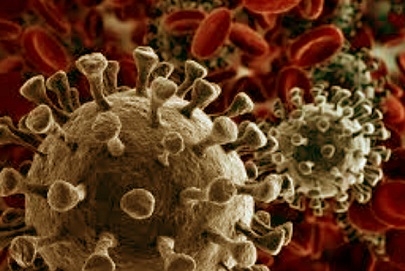Nikhil Prasad Fact checked by:Thailand Medical News Team Sep 20, 2024 1 year, 5 months, 3 days, 14 hours ago
Medical News: Unveiling a New Strategy Against SARS-CoV-2 Variants
As COVID-19 continues to challenge healthcare systems globally, the emergence of more infectious SARS-CoV-2 variants has created new hurdles in transitioning from a pandemic to an endemic. Recent research reveals that blocking a key cell pathway, the Epidermal Growth Factor Receptor (EGFR) pathway, can significantly reduce the infection rate of these variants, offering hope for future antiviral therapies.
 Blocking EGFR pathway reduces SARS-CoV-2 infections
Blocking EGFR pathway reduces SARS-CoV-2 infections
Researchers from Incheon National University and Yonsei University in South Korea have uncovered a promising new treatment strategy that targets the EGFR pathway. This study explored how the SARS-CoV-2 spike protein, essential for the virus to infect human cells, triggers the EGFR pathway and whether inhibiting this pathway could help reduce viral infections.
The Role of the EGFR Pathway in COVID-19
The EGFR pathway is a critical cell signaling mechanism that controls cell survival, growth, and proliferation. It is well known for its role in cancer, where overactive EGFR signaling leads to uncontrolled cell growth. This
Medical News report highlights findings from the study that shows SARS-CoV-2 variants, such as Omicron and Delta, also activate this pathway when they infect human cells.
One of the main focuses of this study was to test whether using EGFR inhibitors, particularly osimertinib, an anti-cancer drug, could reduce the infection rate of SARS-CoV-2 variants. The researchers generated pseudoviral particles mimicking SARS-CoV-2 variants and infected cells to see how the EGFR pathway was activated and if inhibiting it could lessen the infection.
Study Design: Investigating Osimertinib’s Effects
The researchers tested the effects of osimertinib in various human cell models, including HEK293 cells that express the hACE2 receptor and A549 lung cancer cells. They found that the Omicron variants exhibited heightened infectivity in these cells and showed significant activation of the EGFR pathway. Osimertinib was able to inhibit this activation, leading to a considerable reduction in viral infection rates across multiple cell models.
The study involved both 2D and 3D spheroid cell cultures, where the latter is considered a more accurate model of human tissue. In both setups, osimertinib effectively reduced the infection rates of Omicron and Delta variant pseudoviral particles. Importantly, the inhibition of the EGFR pathway by osimertinib did not compromise cell viability in the HEK293 cells, suggesting that the antiviral effects were not due to toxic effects on the cells themselves.
Key Findings: A Significant Breakthrough
-Heightened Infectivity in Variants:
The Omicron BA.2 and BA.4/BA.5 variants demonstrated greater infectivity compared to the original SARS-CoV-2 strain, showing the importance of targeting these variants for future treatments.
-EGFR Pathway Activation
gt;:
Upon infection, there was a notable increase in EGFR pathway activation, particularly in Omicron-infected cells. This suggests that the virus uses the EGFR signaling pathway to enhance its ability to infect human cells.
-Osimertinib’s Antiviral Effects:
Treatment with osimertinib resulted in a significant reduction in viral infection rates. Specifically, Omicron BA.4/BA.5 infections were reduced by 57.2%, Omicron BA.2 by 54.4%, and Delta B.1.617.2 by 44.7%. This shows that osimertinib is particularly effective against these highly infectious variants.
-Cell Viability:
Importantly, the reduction in infection was not due to a decrease in cell viability, especially in the HEK293 cells. In lung cancer cells, there was some reduction in viability at higher osimertinib concentrations, but the antiviral effects were still much stronger than any reduction in cell survival.
Implications for Antiviral Therapy
The findings from this study suggest that osimertinib, a drug already approved for cancer treatment, could be repurposed as an antiviral agent to combat SARS-CoV-2 variants. This discovery could provide a much-needed alternative treatment, especially as variants like Omicron and Delta continue to challenge existing vaccines and treatments.
The fact that osimertinib selectively inhibits SARS-CoV-2 variant infections without causing significant harm to normal cells is crucial. It opens the door to exploring EGFR inhibitors as part of a broader antiviral strategy, potentially protecting against future variants that may emerge.
Conclusion: A Pathway to New Treatments
This research sheds light on the potential of EGFR inhibitors in combating highly infectious SARS-CoV-2 variants. As the world continues to grapple with COVID-19, the emergence of variants that can bypass vaccine-induced immunity underscores the need for new therapeutic approaches. By blocking the EGFR pathway, scientists may have found a new avenue to fight not only the current variants but also any new mutations that may arise.
With these findings, the study paves the way for further exploration into how EGFR inhibitors could be integrated into treatment protocols for COVID-19. The selective effectiveness of osimertinib against the EGFR pathway highlights its potential as a targeted antiviral therapy that could complement existing vaccines and therapies.
The study findings were published in the peer-reviewed journal: Microbiology Spectrum.
https://journals.asm.org/doi/10.1128/spectrum.01583-24
For the latest COVID-19 News, keep on logging to Thailand Medical News.
Read Also:
https://www.thailandmedical.news/news/study-shows-that-kidney-function-and-egfr-decreases-at-six-months-after-sars-cov-2-infection-for-long-covid-patients
https://www.thailandmedical.news/news/breaking-covid-19-news-scientists-discover-that-sars-cov-2-spike-protein-activates-the-epidermal-growth-factor-receptor-mediated-signaling
